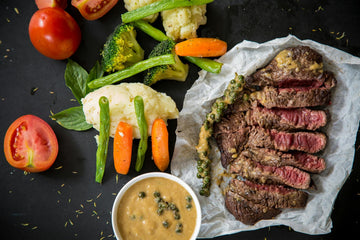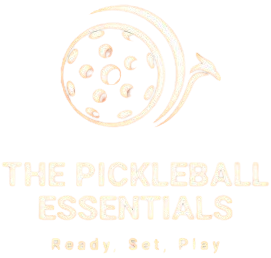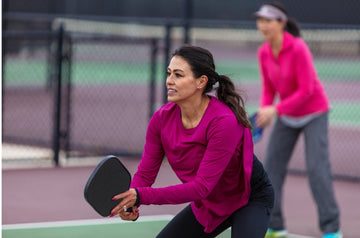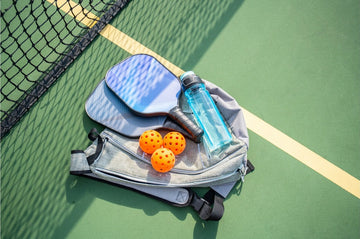Nutrition for Pickleball Players: A Guide to Optimizing Performance and Health
by Linda Conrad on Aug 27, 2024

Introduction
Nutrition plays a crucial role in the performance, recovery, and overall health of athletes, and pickleball players are no exception. Whether you're playing recreationally or competitively, fueling your body with the right nutrients can enhance your endurance, improve your game, and help prevent injuries. This guide will explore the key aspects of nutrition tailored specifically for pickleball players, including pre-game meals, in-game snacks, and post-game recovery nutrition. By following these guidelines, you can ensure your body is in top condition to meet the physical demands of pickleball.
The Role of Nutrition in Pickleball
- Energy for Performance:
- Playing pickleball requires quick movements, bursts of speed, and sustained energy, especially in long matches. Carbohydrates are the body's primary source of energy, and consuming enough carbs before and during play helps maintain stamina and prevent fatigue.
- Statistics: According to sports nutrition experts, athletes should aim for 45-65% of their total daily calories from carbohydrates, especially those who are actively training or competing.
- Muscle Repair and Growth:
- Protein is essential for muscle repair and growth, particularly after intense play. Engaging in regular pickleball sessions can lead to muscle wear and tear, making adequate protein intake crucial for recovery and preventing muscle loss.
- Statistics: The American College of Sports Medicine recommends athletes consume 1.2-2.0 grams of protein per kilogram of body weight per day to support muscle repair and growth.
- Hydration and Electrolyte Balance:
- Hydration is critical for maintaining performance and preventing cramps, heat exhaustion, and other heat-related issues. Electrolytes such as sodium, potassium, and magnesium help regulate fluid balance and muscle function.
- Statistics: Dehydration of just 2% of body weight can lead to a noticeable decrease in athletic performance. Ensuring adequate fluid and electrolyte intake is essential for optimal performance.
- Reducing Inflammation and Injury Risk:
- Anti-inflammatory foods can help reduce muscle soreness, joint pain, and the risk of chronic inflammation. Consuming a diet rich in antioxidants and omega-3 fatty acids can support recovery and overall joint health.
- Statistics: Chronic inflammation is a risk factor for many diseases and conditions. Diets high in anti-inflammatory foods can reduce inflammation markers in the body.
Pre-Game Nutrition: Fueling for Success
- Carbohydrate-Rich Meals:
- Eating a meal rich in complex carbohydrates 2-3 hours before playing provides the body with a steady release of energy. Foods such as whole grains, brown rice, sweet potatoes, and quinoa are excellent options.
- Example Meal: Grilled chicken with quinoa and steamed vegetables, or a bowl of oatmeal with fruits and nuts.
- Incorporate Protein:
- Include a moderate amount of protein in your pre-game meal to help sustain energy and prevent muscle breakdown. Options include lean meats, eggs, Greek yogurt, or plant-based proteins like beans and lentils.
- Example Meal: Turkey sandwich on whole-grain bread with avocado and spinach, or a smoothie with protein powder, banana, and almond milk.
- Avoid High-Fat and High-Fiber Foods:
- High-fat and high-fiber foods can cause digestive discomfort during play. It’s best to avoid greasy or fried foods and limit fiber intake before the game to prevent gastrointestinal issues.
- Tip: Opt for easily digestible foods that provide a balance of carbohydrates and protein without heavy fats.
In-Game Nutrition: Sustaining Energy Levels
- Hydrate Regularly:
- Drinking water is essential during play to maintain hydration levels. For games lasting more than an hour or played in hot weather, consider drinking a sports drink that contains electrolytes to replenish lost salts and minerals.
- Tip: Sip water every 15-20 minutes during breaks, and use electrolyte drinks if sweating heavily.
- Quick Energy Snacks:
- For long matches or tournaments, having quick energy snacks on hand can help maintain blood sugar levels and energy. Choose easily digestible, carbohydrate-rich snacks such as bananas, energy gels, sports bars, or dried fruits.
- Example Snacks: A banana, a handful of raisins, or an energy gel pack can provide a quick energy boost without causing digestive distress.
- Electrolyte Replacement:
- Electrolyte tablets, powders, or drinks can help prevent cramping and maintain muscle function. Look for products that contain sodium, potassium, and magnesium to support hydration and muscle health.
- Tip: If you’re sweating heavily or playing for extended periods, consider an electrolyte supplement to maintain balance.
Post-Game Nutrition: Recovery and Repair
- Replenish Carbohydrates:
- After playing, it’s important to replenish glycogen stores with carbohydrates. Aim to consume a mix of complex and simple carbs within 30 minutes of finishing play to kickstart recovery.
- Example Meal: A whole-grain wrap with lean turkey, hummus, and veggies, or a bowl of brown rice with grilled salmon and steamed broccoli.
- Protein for Muscle Repair:
- Consuming protein after exercise is crucial for muscle repair and growth. Aim for 20-30 grams of high-quality protein in your post-game meal or snack to support recovery.
- Example Snack: Greek yogurt with honey and berries, or a protein shake with whey protein, banana, and almond milk.
- Include Anti-Inflammatory Foods:
- Foods rich in omega-3 fatty acids, antioxidants, and phytonutrients can help reduce inflammation and speed up recovery. Include foods such as fatty fish, nuts, seeds, berries, and leafy greens in your diet.
- Example Foods: Salmon, chia seeds, walnuts, spinach, blueberries, and turmeric.
- Hydration and Electrolyte Balance:
- Continue to hydrate after the game to replace fluids lost through sweat. Drinking water and including electrolyte-rich beverages can help restore balance.
- Tip: Weigh yourself before and after playing to estimate fluid loss and drink accordingly.
Nutrition Tips for Optimal Health and Performance
- Eat a Balanced Diet:
- Incorporate a variety of foods to ensure you’re getting all the necessary nutrients. A balanced diet includes lean proteins, whole grains, healthy fats, and plenty of fruits and vegetables.
- Focus on Meal Timing:
- Timing your meals around your play schedule can help optimize energy levels and recovery. Eat larger meals 2-3 hours before playing and include snacks closer to game time.
- Listen to Your Body:
- Pay attention to how different foods and meal timings affect your performance. Adjust your nutrition plan based on what makes you feel energized and performs at your best.
- Consult a Nutritionist:
- If you have specific dietary needs or health concerns, consider consulting a sports nutritionist. They can provide personalized advice and create a nutrition plan tailored to your goals and needs.
Conclusion
Nutrition is a vital component of performance, recovery, and overall health for pickleball players. By focusing on pre-game, in-game, and post-game nutrition, you can fuel your body for optimal performance and ensure quick recovery. Remember to stay hydrated, choose balanced meals, and listen to your body’s needs. With the right nutrition strategy, you can enhance your pickleball game and enjoy the sport to its fullest.
For more health and wellness tips related to pickleball, visit The Pickleball Essentials Health and Wellness Page



